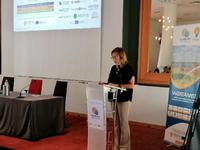Press Releases

17-10-2023 11:03
Presentation by the Deputy Minister to the President, Ms Irene Piki, at the 6th Digital Agenda Cyprus Summit
"Shaping Tomorrow: The Confluence of Government Priorities
and Technology"
1. Introduction
Good morning. It is with great pleasure that I participate in today’s Digital Agenda Cyprus Summit. I would like to take this opportunity to congratulate SPP Media for the organization, and for their vision, back in 2018, to create a platform for discussing the future.
Emphasising on technology and digitalisation, recognizing the profound impact they have on our lives.
Ladies and gentlemen,
The global economic crisis of 2012, followed by subsequent crises (health and geopolitical/energy) on a global scale, affected the course of events in Cyprus and created a chain reaction of changes in the daily life of the citizens, primarily influencing their economic situations and subsequently, as expected, their socio-political perceptions.
As a result, there is a devaluation of the political system, reflected in high rates of abstention, with the highest recorded during the Parliamentary Elections of 2021.
Through the Governance Program, a new social contract with citizens has already been implemented, based on an anthropocentric governance plan. In this plan, the focus of all policies is on the citizen, as well as on the modernisation of the state, society, and institutions. The long-term goal is the reconstruction of the middle class.
There is a need for both profound changes and small practical adjustments to make the daily life of everyone living in our country better. Consequently, the social contract undergoes transformation through a series of significant and small reforms aimed at improving the safety and ease of daily life for both citizens and businesses, helping them address real problems.
The Government took office seven months ago, in March, and has set sail to implement an ambitious Government Programme, with specific actions that aim to substantially improve the lives of citizens. The core principles underpinning the Governance Programme include placing people at the core, ensuring a sustainable and resilient economy, a modern fair, participatory and transparent governance, and promoting the green and digital transitions.
Our task is not an easy one. We live in an era marked by continuous challenges, both at the global and national level. Sadly, there is a new war in our immediate region, while the war in Ukraine is still ongoing. The geopolitical environment is volatile and unstable, affecting the global economy and consequently, the welfare of citizens.
Inflation is squeezing household budgets and eroding their purchasing power. High interest rates add further strain, making borrowing more expensive and hampering economic growth. Untargeted / horizontal support measures tend to have a spiral effect. Fiscal policy needs to be analysed with monetary policy. There is an imperative need to bolster the resilience and competitiveness of our economy. Technology can be a catalyst in that respect.
Navigating this complex landscape requires strategic orientation, robust public finances and smart policy decisions. In this respect, our Government adheres to a three-pillar approach that will subsequently increase our competitiveness: fiscal discipline through government budget surpluses, to be able to adequately support those mostly in need, a stable and healthy financial sector and continuous structural reforms.
I would like to stress that the Governance Programme fully aligns with Vision 2035, the national strategy that aims to “transform Cyprus to be one of the world's best countries to live, work and do business in”. Our commitment to its implementation is unequivocal, with many actions already being financed through Cyprus’ Recovery and Resilience Plan with a timeframe up to 2026.
Evidence of our responsible fiscal policy is the budget submitted in Parliament earlier this month for which discussions will start next week in the relevant Parliamentary Committee. This is the first budget of our administration, which gives the stigma/«στίγμα» of our priorities. A budget with a healthy fiscal surplus, reflecting our commitment to fiscal discipline and sound public finances, including a number of reforms and actions derived straight from our Governance Programme.
- [.. the mark of our priorities], which is placing people at the centre and promoting a sustainable and resilient economy, modern governance, and environmental protection. The GDP growth rate in 2024 is estimated at 2,9%. The 2024 budget prioritises strengthening social spending and implementing development projects and reforms outlined in the Recovery and Resilience Plan while maintaining fiscal discipline. Ιt is noted that development expenditure is expected to increase by 12% in 2024 compared to the year 2023. Furthermore, in 2024 an increase of around 15% is expected in expenditure on social benefits. Fiscal surplus for 2024 has been estimated at 2,2% of GDP with a medium-term goal of public debt below 60% by the end of 2026.
This first budget marks the beginning of the unfolding of our Government’s strategic orientation for the five-year term, based on six ambitious but realistic priorities that will guide our actions through 2028.
The first two priorities concern the swift and effective resolution of chronic issues that affect the everyday lives of citizens as well as the citizens of the future. These include the management of issues relating to migration, where Cyprus is facing serious challenges. For this purpose, we are promoting the creation of the Deputy Ministry of Immigration, which will place all issues relating to legal and illegal migration under a single institutional body, thus ensuring greater efficiency, better coordination and more efficient results.
At the same time, we have taken steps to expedite the examination of applications, including through the introduction of a new information system at the Asylum Service.
In addition, we have set up a working group together with representatives of the European Asylum Agency and we are in the final stages of developing a comprehensive reception strategy, which will cover all issues of managing migration flows in the Cyprus.
Lack of affordable housing is another issue that affects especially low - and middle-income households as well as the younger generation. It is an issue that we are committed to address. In this respect, the Government has elaborated a package of specific measures and mechanisms, addressing both the supply and demand side of the housing market in order to facilitate production of more affordable housing units, mainly by the private sector. This package of instruments will incorporate land use initiatives (in the form of additional building coefficient), fiscal measures, as well as fast tracking of applications. Enabling a comprehensive (holistic) approach in affordable housing development will create new potentials for access to affordable housing for all.
Road congestion is also a major issue in Cyprus, which negatively affects the daily lives of citizens. Addressing it will improve the quality of life and would save valuable time for everyone. Furthermore, it will alleviate the negative impact on the economy, as a result of fuel consumption and loss of productive time. More than €520 million will be invested in the next years, through National and European Funds, for infrastructure projects such as peripherical high speed high ways, the introduction of bus and bicycle lanes, the improvement of public transport facilities, including bus stops and the park-and-ride facility. Furthermore, subsidy schemes of around €45 million will support the electrification of transport and the use of photovoltaics for charging is also encouraged through subsidy schemes for replacing older vehicles with low and zero emmision vehicles and more than 45million are put towards that in the next three years under the Recovery and Resilience facility.
In line with what was previously communicated by our Government, we will do our utmost to lay the foundations for a better tomorrow. At the centre of this endeavour is our focus on education and health. The existing educational system must be reformed, so as to equip current and future students with skills which will be applicable and in high demand in the near future. Equally importantly, we will safeguard the health system.
The third priority is a strong and resilient economy. In this respect, as already announced we will transform the country’s current tax system, so as to ensure that our economy will strengthen its competitiveness. This restructuring is being currently devised in conjunction with external advisors, who have already been appointed, as well as the substantial contribution of all stakeholders. Furthermore, we will support and initiate specific actions to enable access to finance, such as the Cyprus Equity Fund, which will utilize state and private funds, as well as the market’s expertise to invest in start-up and innovative companies and the establishment of the Business Development Agency that will support SME’s through targeted financial instruments and support services.
Fourthly, our Government is aiming to effectively resolve the long-standing issue of modernising our state through digitization. Priority on governance includes fighting corruption and the perseverance of meritocracy. One of the government’s first decisions was to deal with US and UK sanctions giving a clear message to all involved and the international community. Our Government took immediate action, by deciding specific measures, based on a zero-tolerance policy. These include actions for the enhancement of the governance and supervision of administrative services providers. Within this framework, the establishment of a Single Supervisory Authority for these services will be examined.
We need to become more efficient! Our vision is to strengthen the work of the Government, by coordinating and providing support for the timely and effective implementation of policies, the promotion of reforms and the implementation projects, on the basis of strategic planning and in cooperation with all relevant Ministries and Deputy Ministries. It is about time that the implementation of government decisions is thoroughly monitored.
The establishment of the Secretariat follows best practices of many other European countries, whose respective mechanisms have contributed catalytically to the optimization of procedures and timely implementation of their government policies. The Secretariat will utilise agile practices and methodologies to streamline its operations as a central coordination body. These practices will promote collaboration and flexibility to achieve the highest possible efficiency towards serving the government's strategy and goals.
An equally important priority is green transition, fully compliant with our European goals. The overarching aim of this initiative is to ensure that all households will have access to low-cost clean energy. Cyprus has an isolated energy system, high dependence on air transportation and shipping, high use of private cars, as well as high rate of energy poverty. All these factors render the green transition challenging.
For this reason, we aim to maximise the opportunities offered by European funding. About €1.1 billion will be allocated and together with national and private funds, it is estimated that the amount of investment until 2030 will reach approx. €3 billion.
At the cornerstone of all that we do is of course our efforts for a reunified, prosperous Cyprus through a viable comprehensive settlement of the Cyprus question, in line with the agreed UN framework, UNSCRs and EU law. We believe that the current status quo cannot be the future of Cyprus and President Christodoulides, since day one of his election, prioritized the need to break the current stalemate in the negotiations. We believe we have a window of opportunity to achieve this, that the EU has a key role to play in this regard, and we are working with our EU partners, with the US and other key players in this direction.
Concurrently, the questioning of the sovereignty and territorial integrity of the Republic of Cyprus from Turkey, the current challenges and hybrid threats, render the strengthening of the defense and the deterrent power of our country as a priority. Furthermore, the status of Cyprus as member state of the European Union but also the role it can play in its wider region of the Eastern Mediterranean, reinforce the aforementioned need even more. Within this context, we are purposefully strengthening the deterrent power of the Republic of Cyprus with further increasing defense spending, establishing and strengthening defense agreements and partnerships with third countries and the full utilization of the opportunities that arise through our membership in the EU.
In addition, the state should be able to respond effectively to asymmetric threats, such as illegal migration flows, cyber warfare, climate change, terrorism and generally any kind of hybrid threat. In this context, we have established a National Security Council; an advisory body to the President on matters of national security, including defence, foreign policy and of course the Cyprus issue.
At the same time, a plethora of additional initiatives are also undertaken which specifically aim at enhancing the attractiveness of Cyprus as an investment destination, with the aspiration to create an attractive business environment that promotes transparency, efficiency, and which diversifies our economy. With the abovementioned rationale, we are diligently working towards the implementation and gradual revamping of the existing Strategy for Attracting Investment and Talent, which was launched in 2022.
In the same trajectory, the government is exclusively aiming to undertake specific actions for the branding of Cyprus, which is indispensable to enhancing our country's appeal to investors and professionals, as it can significantly influence perceptions and decisions, and create a compelling narrative that resonates with international audiences. This will also safeguard the reputation of Cyprus as a credible centre for financial and professional services. Understanding that a strong and positive reputation is a valuable asset, as it instills confidence and trust among investors, both domestic and international, we are working on a comprehensive and coherent brand for Cyprus, showcasing Cyprus as a reliable, forward-thinking, and attractive destination for diverse opportunities and experiences.
So, how does technology and digital transition confluence with the government’s strategic planning?
Understanding the catalytic effect that digital transformation can have on all the priorities I have mentioned.
Our government focus is on untangling and accelerating the execution of a long pipeline of projects by adding expertise and resources to the effort undertaken by the Deputy Ministry of Research, Innovation and Digital Policy.
Recently, we have extended the responsibilities of our new Chief Scientist to act as a Chief technology officer, focusing on accelerating the adoption of digitization, and digital transformation as we implement the much-needed e-government reforms and investments. On that same note, we are planning to enhance the Digital Services Factory to establish development standards and a tendering model for service development. At the core of our efforts lies the imperative for effective digitalization, achieved through the reengineering and redesign of processes where necessary. Our ultimate goal is the faster, seamless and frictionless delivery of services to the citizen.
The focus will be on key digitalisation initiatives that can significantly enhance public service efficiency and improve people's and businesses' engagement with it. I refer to projects such as the (1) Integrated Tax Administration System, (2) the digital transformation of courts, (3) the Integrated Information System for the Registrar of Companies and Official Receiver, (4) the Integrated Land Information System (ILIS), (5) solutions for the Civil Registry and Migration Department and the Social Security Services, (6) new e-procurement system and of course (7) the e-wallet. I would also like to highlight the initiative for creating a Platform for Non-Binding Referenda as a means to promote participatory governance.
In addition to the aforementioned flagship projects, a range of public services, simple to more complex, will undergo digitalisation based on prioritisation, taking into account the value they bring to both society and the economy.
We have also set in motion an ambitious project to introduce new digital service models for citizens and businesses, utilizing emerging technologies i.e. artificial intelligence, machine learning and cybersecurity.
We aspire to create the next generation Digital governance model for Cyprus and to accelerate the rate of adoption of digital technologies by all stakeholders of our ecosystem by offering a consistent, unique, autonomous self-service, frictionless service reducing complexity, while optimizing efficiency leading to extraordinary “customer” experience.
Artificial intelligence (AI) holds an immense potential in that respect. It can optimise resource allocation, streamline administrative processes, and contribute to data-driven decisions. AI can vastly improve public services by increasing efficiency, reducing costs, and enhancing overall citizen experience. Moreover, AI can help the government better understand and anticipate emerging challenges, such as public health crises or climate change, by analyzing vast datasets and providing valuable insights. However, while using AI, we need to place a strong emphasis on transparency, ethics, and the protection of individual privacy. With these principles in mind, AI can play a pivotal role in creating more agile, responsive, and effective governance that meets the evolving needs of citizens in the digital age.
Ladies and gentlemen,
In concluding, I would like to emphasise that the priorities of our government are essentially intertwined with our commitment to integrating technology and digitalization into our policies. Our leadership understands that effective governance is not about just systems and structures; it is about placing people and their needs at the core of every decision we make.
As we navigate the challenges and opportunities of the digital age, we firmly believe that technology is not just a tool, but a catalyst for ensuring a sustainable economy and fostering real change in the daily lives of citizens. It empowers us to create a more inclusive, efficient, and responsive government that truly serves the people.
In the era of rapid technological advancement, we are determined to harness the full potential of innovation to bridge the gap between our priorities and the policies we enact. We strive to build a future where every citizen benefits from the digital revolution, where no one is left behind, and where our commitment to people remains unwavering.
Let us remember that, at the heart of our governance, it is the well-being and prosperity of our citizens that matter the most. Together, with the integration of technology, we can chart a path to a brighter, more connected, and inclusive future for all.
Thank you for your attention.
(RM/EP/SCH)
Relevant Press Releases







